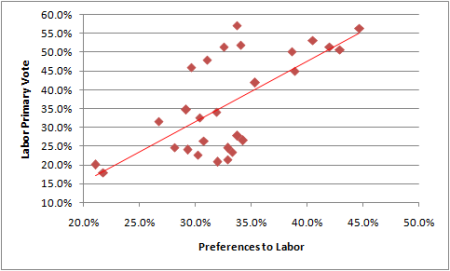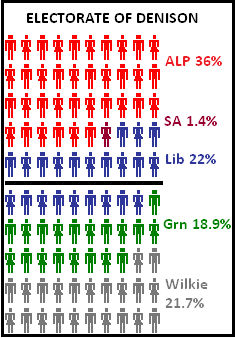The Great Reformer?
Wednesday’s National Press Club Address made interesting viewing on a number of levels. But if you went beyond Bob Katter’s personal odyssey from Brazilian economic policy to the failure of the ‘Coles-Woolworths’ Australian political system the most interesting point was the performance of Port Macquarie based MP Rob Oakeshott. As the questions started flowing, it was clear that Oakeshott has become the de facto leader of the cross-bench MP’s.
Oakeshott’s apparent leadership role is something of a surprise. But while he’s the youngest and most recently elected of the three rural independents, Oakeshott also has the most detailed prescription and list of recommendations for prospective PM’s. Katter has largely confined himself to the concept that he’s been elected to get a return for his constituents which he’ll ensure is receive and Tony Windsor focuses more on ensuring a stable government to last a full term. Green MP Adam Bandt has focused his discussions on ensuring planks of his party’s platform are incorporated in a stable, effective and progressive Government, while Denison MP Andrew Wilkie’s election was such a surprise that it’s understandable if his strategies for a hung parliament weren’t quite so developed.
But Oakeshott has far reaching reforms in mind. Quite simply, he wants to revolutionise the way Australian politics work.
For Oakeshott, the current parliamentary system is an opportunity rather than a threat – he’s ‘a glass half-full kind of guy’. Rejecting the language of ‘hung parliaments’, he instead believes that the current constitutional situation allows for balanced governments formed from across party lines. He has stated that he’s not interested in a government formed by ‘Red Team plus plus plus’ or ‘Blue team plus plus plus’ and has suggested a better alternative would be for the people to be sent to the polls – a big statement for an MP who couldn’t hope to have the same level of power after such an election. It’s stability – rather than a pivotal role for himself – that will determine who he will support, if anyone.
The key is for all members of parliament to look beyond ‘political party democracy’ towards a parliamentary democracy in which they act as local members. In this sense, Oakeshott argues that the current fluid situation is one which will be decided not by a handful of independent MPs but by all 150.
The key here is that Parliament needs to become more politically powerful, vis-a-vis the Cabinet executive. Deriding a governmental system in which polls, vested interests, and increasingly smaller sections of the ruling political party determine the agenda, Oakeshott is pushing for local MP’s and parliamentary committees to have more resources and to have a better role in putting forward policy suggestions. Question time would be reformed to move away from the increasingly juvenile and confrontational situation where the Government attempts to harangue an Opposition intent on launching political attacks, while both sides try to score the key quote for that evening’s nightly news.
Oakeshott acknowledges the role of conflict within political debate and has no idealistic views that policy can be determined completely through consensus. However Oakeshott wants this conflict to be moved back onto the floor of parliament. Hoping for more conscience votes he argues that it’s the majority view of the parliament that should matter rather than the majority view of the governing party. Allowing the opinions of all MPs to flourish in a robust debate within parliament would allow the political system to regain some of the respect it has increasingly lost within the electorate.
It’s clear that Oakeshott is taking a lead from the American political system, in which members of Congress have some leeway to vote against their party interests if their conscience, or the interests of their electorate, demands a more independent voice. But the weakness in the comparison is that the American has an executive which sits separate from the legislative body. Under the current Australian system, the Government has to maintain the confidence of the house, and any Government which introduces a bill which fails to achieve a majority within the House of Representatives is a Government which is flirting with instant dismissal. To expect Government MPs to choose an independent stand on a specific bill over the survival of the Government probably goes beyond reasonable hopes. Oakeshott has admirable goals for the parliament but to hope this level of reform can occur immediately and at the behest of one independent might be a bridge too far.
Many of Oakeshott’s policy positions are driven from his belief that Australian politics would be best served from respecting the role of independent reports and parliamentary committees. On climate change, he argues that we need to return to where the Garnaut Report process went off the rails. An acceptance of the scientific research which found that climate change had human origins led to a plan being put forward by eminent economist Ross Garnaut. But for Oakeshott, the successive concessions and backdowns made by the Rudd Government on the ETS was where the debate went wrong. The current situation offers the chance of a ‘do over’ – for the new Government to go back to the original report and take on a lot of its recommendations.
The believe that ‘we ended up with mush’ once policy positions entered the political process is a common theme espoused by Oakeshott. He bemoans the process which saw a detailed tax review, involving eminent economists and business figures such as Ken Henry and Heather Ridout, produce little more than a fight with the mining industry on a concept which they originally supported. He’d like to see the parliament as a whole go back to the original review and look through all of it’s recommendations.
On broadband, Oakeshott doesn’t believe the Government and Opposition’s plans limit his options to an ‘either/or’ choice. Citing his own electorate around Port Macquarie, he states that broadband is of crucial importance but that the ‘pick and mix’ approach adopted by the Opposition has benefits in the hilly areas around Port Macquarie. While hoping for a ‘consensus model’, when pushed he prefers the Government’s model. However, it doesn’t sound like a deal breaker. Oakeshott has stated ‘very loudly’ that offshore processing is both a waste of money and poor policy, as Oakeshott suggests there would be many rural communities which would be happy to host humane processing facilities. The key is to ‘put fear in the back pocket.’
Oakeshott seems an unlikely parliamentary reformer – the ex-National Party MP from the seachange town on NSW’s north coast. The stereotype would suggest an independent rural MP with this kind of power would focus heavily on ensuring his electorate is looked after. But he’s aiming his one shot at real political power on reforms which could alter the way politics works in Australia irrevocably.



 Posted by carefullyscriptedremarks
Posted by carefullyscriptedremarks 






